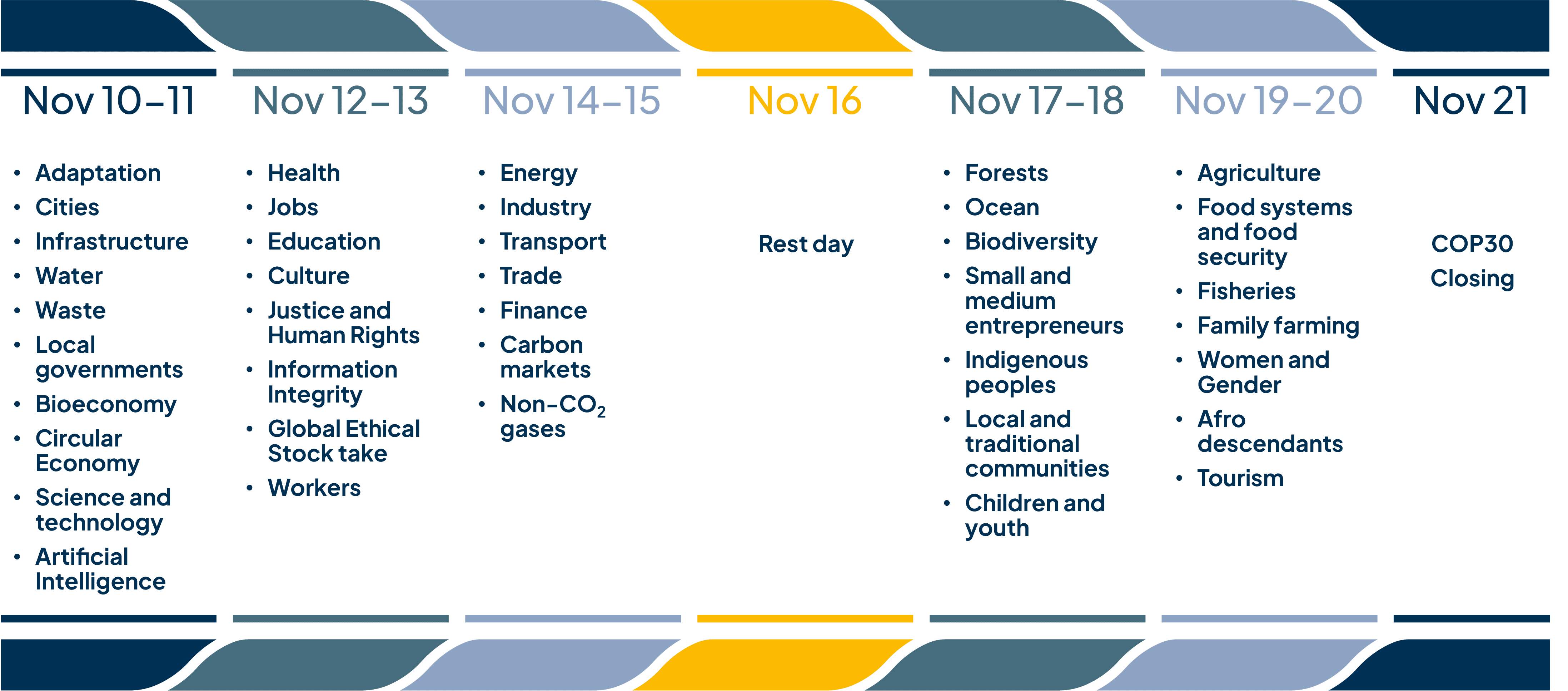The upcoming 30th United Nations Climate Conference (COP30) provides an important moment for board directors to strategically assess how their organisations’ climate commitments align with global efforts to accelerate the transition to a low carbon economy. Taking place in Belém, Brazil from November 10 to 21, 2025, COP30 occurs at a “symbolic moment,” marking the 10th anniversary of the adoption of the Paris Agreement. Together, nearly 200 nations will gather to review the state of global climate action and identify key barriers to progress. The United Nations Framework Convention on Climate Change (UNFCCC) has set the ambition of moving “from promise to practice”, with the COP30 Presidency identifying the upcoming negotiations as the “implementation COP,” focusing on turning commitments into real-world outcomes for climate resilience, biodiversity, and human wellbeing.
For board directors, this represents more than a policy update – it is a call to action to assess how businesses’ strategic planning can deliver climate resilience and align with global climate commitments. As momentum builds around concrete solutions and measurable impact, directors should monitor emerging signals from governments, investors, and regulators to anticipate how the next phase of climate ambition is likely to shape corporate strategy.
Key Messages for Board Directors
- Closing the ambition-action gap: Scrutiny of countries’ updated Nationally Determined Contributions (NDCs) will be a key focus of COP30 negotiations. While businesses have played a leading role in the clean energy transition to date, COP30 presents an opportunity to ratchet up this effort – continuing to showcase leadership and put forward actionable pathways to enable accelerated climate transition timelines, bridging gaps in green industrial investment and technology deployment. Initiatives such as the Sustainable Business COP (SB COP) will play a critical role in this process by enabling private sector contributions to COP discussions with actionable recommendations and examples of business-led projects that can drive tangible progress on the global climate agenda.
- Finance for nature and biodiversity: COP30’s setting in the Amazon region reflects a central focus on nature and biodiversity. Nature-based solutions are gaining prominence as governments and investors increasingly recognise their ability to deliver both economic returns and climate co-benefits, with finance playing a critical role in scaling effective mitigation and adaptation efforts. This creates both accountability pressures and new market opportunities for businesses.
- Multilateral action: Pre-COP30 forums have focused on the need to reinforce multilateralism within the global climate agenda. Directors should ensure their companies are positioned to respond to multilateral initiatives and anticipate opportunities to influence and benefit from collaborative climate action.
- Positive climate tipping points: As reports indicate the first global climate tipping point may have been reached, the urgency for decisive action at COP30 is intensifying. Directors have a role to play in driving business leadership that creates the conditions for the technologies and business models needed to avert crisis tipping points and accelerate positive tipping points. Positive tipping points are the pivotal thresholds where innovation and behavioural shifts combine to propel large-scale rapid decarbonisation.
Key Actions for Board Directors
- Engage in collective mobilisation: The outcome of this year’s negotiations will depend on how effectively stakeholders respond to COP30’s call for a Global Mutirão – a collective effort on climate action. This means recognising the critical role of businesses in advancing collaborative sustainable solutions through reducing emissions, green technology investments, and stronger supply chain resilience. In addition, the technical rules for a regulated global carbon market will be finalised with implications for business markets. Boards should ensure these priorities are embedded in strategic and market decisions, taking the opportunity to engage with industry peers and stakeholders to reinforce decisions and drive collective action.
- Secure business voice in climate finance agenda: A key priority of this year’s negotiations is ironing out a delivery plan for the Baku to Belem Roadmap, a joint initiative by the COP29 and COP30 presidencies to mobilise $1.3 trillion in climate finance by 2035. Board directors should actively engage in these discussions to ensure that mechanisms for unlocking, directing, and maximising finance flows reflect business priorities. Proposed reforms to multilateral development banks and expansions of concessional finance and climate funds will shape future market opportunities and access to capital.
- Champion higher ambition in national climate plans: Ahead of COP30, all member countries were required to submit updated 2035 Nationally Determined Contributions, setting out more ambitious 10-year climate plans. As COP30 focuses on the credibility of these plans, board directors should ensure their businesses are aligned with higher ambition levels and remain responsive to calls to scale up further. This involves embedding climate transition planning into core business strategy, moving beyond treating it as a short-term compliance exercise.
- Strengthen climate and nature governance: Boards should review and update governance structures to ensure effective oversight of both climate and nature-related risks and opportunities. Integrating nature considerations into risk management will help safeguard long-term value and strengthen organisational resilience amid evolving global commitments and increasing climate impacts.
- Scale up solutions in emerging markets: COP30’s emphasis on ramping up just transition initiatives, biodiversity investment, and nature-based solutions in climate-vulnerable countries presents significant growth opportunities. Alignment with these priorities enables businesses to unlock value through adaptive models that are both resilient to climate impacts and regulatory shifts, and responsive to changing stakeholder expectations and emerging markets.
Central Themes at COP30 of Importance to Board Directors
COP30’s Action Agenda is structured around the following themes:
Unlocking enablers and accelerators including on finance, technology, and capacity-building: Across its thematic focuses, COP30’s action agenda calls for a Global Mutirão – a collective mobilisation – to deliver the priorities of the Global Stocktake (GST) as if it were a globally determined contribution (GDC). Focus will be on bringing non-state actors into negotiations in a more coordinated way, in order to accelerate the deployment of capital into innovation and capacity-building to cut emissions. Some key elements to track include:
- Carbon markets – COP30 has announced proposals for a global coalition for carbon markets. Following agreement on key Article 6 implementation guidance at COP29, this year’s negotiations will focus on finalising technical rules to operationalise the market. Directors should assess the changing regulatory landscape, to ensure they are up-to-date with requirements and expectations for businesses’ participation in these markets.
- Climate finance – Finance is expected to underpin COP30 negotiations. Taking forward from COP29, mobilising the Baku to Belem Roadmap to $1.3 trillion by 2035 is a key objective. This is supported by the COP30 Circle of Finance Ministers’ priorities of reforming Multilateral Development Banks (MDBs); expanding concessional finance and climate funds; creating country platforms and boosting domestic capacity to attract sustainable investments; developing innovative financial instruments for private capital mobilisation; and strengthening regulatory frameworks for climate finance – all of which are likely to have relevant implications for board directors.
Energy, Industry & Transport: Building on existing pledges to triple renewable energy capacity and double energy efficiency by 2030, the Belem Commitment for Sustainable Fuels – also known as “Belem 4x” – was launched at a pre-COP meeting. It commits countries including Brazil, India, Italy, and Japan to at least quadruple the production and use of sustainable fuels by 2035. This follows an October 2025 report from the International Energy Agency (IEA), which finds that accelerating the deployment of sustainable fuel technologies could deliver up to $1.5 trillion in investment between 2024 and 2035. Directors should explore how this heightened ambition, supported through blended public-private financing models, can help streamline investment in, and implementation of, sustainable technologies.
Forests, Oceans & Biodiversity: The climate-nature nexus is expected to be a central focus at this year’s negotiations. The COP30 Action Agenda looks to mobilise efforts to halt deforestation by 2030, with a key priority of gaining support for the Tropical Forests Forever Facility (TFFF), a blended finance instrument aiming to catalyse $125 billion to reward countries for conserving tropical forests – targeting $100 billion from the private sector. The negotiations also aim to finalise the Global Goal on Adaptation under the Paris Agreement, determining how to mobilise the $40 billion needed to fulfil the COP26 pledge to double countries’ adaptation finance. This ambition is reinforced by the UNFCCC’s National Adaptation Plans Progress Report, released in October 2025, which highlights that the scope and scale of investment in climate resilience must increase. A global report launched ahead of COP30 finds that adaptation investment delivers four times more benefits than costs, and that the global market could reach up to $1.3 trillion annually by 2030. Directors should evaluate where such investments can both mitigate potential losses and create new commercial opportunities.
Agriculture & Food Systems: COP30 is seen as “the most comprehensive inclusion of food systems” to date in a COP, placing land restoration, climate adaptation, and food security at the forefront. The Action Agenda calls for the restoration of 250 million hectares of degraded land by accelerating investment towards resilient agriculture. Directors can actively participate in discussions to scale up clean energy investment across agricultural and commodity supply chains, promote nature-positive practices, and support innovations that strengthen food systems resilience.
Cities, Infrastructure & Water: COP30 also emphasises the critical importance of regional and local government leadership across climate infrastructure challenges, and the need to integrate business, regional, and city pledges into the future of the action agenda. For businesses, this involves engaging across different levels of government and climate policymaking to drive initiatives that collectively bring communities closer to achieving national and international climate commitments. Multilevel collaboration enables solutions that are scalable, locally relevant, and aligned with global climate goals. By prioritising climate-resilient infrastructure, businesses can help ensure investments strengthen both local resilience and long-term business value.
Human and Social Development: COP30’s agenda underscores the need for inclusive and equitable climate action. The Belém Action Mechanism for Just Transition aims to address the fragmentation of just transition efforts within and between countries, defining how governments and the private sector can put people at the centre of national and sectoral transitions. Together with the Global Ethical Stocktake initiative, this creates an opportunity for board directors to collaborate with governments and other stakeholders to co-develop climate resilience and stewardship projects that bring together climate and development priorities. Directors can also contribute business expertise, data, and insights to accelerate learning and scale effective solutions.
COP30 Engagement Opportunities for Board Directors
Board directors attending COP30 can engage through various events in the Blue Zone (formal negotiations) and the Green Zone (for NGOs, civil society, academia, and business). This includes the Business Pavilion, hosted by the We Mean Business Coalition, which provides a platform for businesses to voice their climate commitments and engage with policymakers. See Annex 1 for more information.
Conclusion
The lead-up to COP30 offers an opportunity for board directors to reflect on their companies’ climate goals, progress, and responsiveness to policy trends. COP negotiations and their outcomes have significant influence on regulatory frameworks, investor expectations, and market conditions – factors which shape companies’ strategic, financial, and sustainability priorities. By staying engaged in and informed on these developments, directors can provide stronger strategic oversight and safeguard their companies’ alignment with evolving climate priorities and policy expectations.
Annex 1. Key Information on COP30 for Business Leaders
What is COP?
The Conference of the Parties of the United Nations Framework Convention on Climate Change (COP) is the United Nations Climate Conference held annually to discuss and accelerate global climate action at the international, regional, national, and local levels. At COP, country representatives monitor and strengthen the implementation of the Paris Agreement, which aims to limit global warming to 1.5°C. The conference also provides a platform for collaboration on climate finance, clean energy, and sustainability initiatives, with both the public and private sectors playing crucial roles.
What is COP30?
COP30 is the 30th meeting of the Conference of the Parties, taking place in Belém, Brazil, from November 10 to 21, 2025. It is the first COP to be hosted in the Amazon region and will bring together nearly 200 nations to discuss pathways for advancing global climate progress.
The core focus of COP30 includes:
- Assessing emissions reductions progress in accordance with the Paris Agreement, determining whether Parties’ updated Nationally Determined Contributions (NDCs) set out the needed enhanced ambition levels and deliverability to meet 2035 climate action goals as set out in the Global Stocktake;
- Finalising the Global Goal on Adaptation, boosting adaptation finance which currently covers only around a tenth of identified needs;
- Embedding nature and biodiversity into climate finance frameworks including the Tropical Forests Forever Facility (TFFF) to accelerate mitigation and adaptation efforts;
- Mobilising public-private sector collaboration to transform pledges into practice, and deliver on investment opportunities;
- Empowering regional and local governments to unlock climate finance and drive multilevel climate solutions in partnership with business.
At the previous COP29 held in Baku in November 2024 – dubbed the “Finance COP” – countries agreed to scale up finance to $1.3 trillion per year by 2035 for climate action in developing countries (i.e. the Baku to Belem Roadmap). Other key outcomes included the agreement on UN carbon market standards as part of Article 6 of the Paris Agreement; countries’ commitment to the Global Energy Storage and Grids Pledge to significantly increase global energy storage by 2030; and an increased number of signatories to the Coalition to Phase Out Fossil Fuel Subsidies. Last year’s negotiations did however fail to reach agreement around how to carry through the outcomes of COP28’s Global Stocktake, which remains a key focus at COP30.
What will COP30 negotiations focus on?
COP30 negotiations will focus on several critical themes to advance global climate efforts:
- Transitioning energy, industry, and transport
- Stewarding forests, oceans, and biodiversity
- Transforming agriculture and food systems
- Building resilience for cities, infrastructure, and water
- Fostering human and social development
- Unlocking cross-cutting enablers and accelerators

How Can Businesses Engage at COP30?
Businesses play a critical role at COP30, engaging through various events, partnerships, and discussions. Corporate board directors and their organisations can participate in the following ways:
- Attending COP30 Events: Businesses can engage through events in both the Blue Zone (formal negotiations) and the Green Zone (non-state actors, including civil society, academia, and business).
- The Business Pavilion: Hosted by the We Mean Business Coalition, this pavilion provides a coordinated business voice to COP30, enabling companies to showcase their leadership in driving climate action and collaborate with policymakers.
- Policy Engagement: Many businesses also participate in policy engagement through lobbying groups and advocacy efforts to shape discussions around climate financing, carbon markets, and sustainable business practices.
By attending and engaging with these events, businesses can directly influence the global climate agenda, explore new investment opportunities, and demonstrate their commitment to sustainability.
Blue Zone Venue for formal negotiations - accredited participants only (e.g., country negotiators, observers, and media).
|
Green Zone Venue for non-state actors (e.g., NGOs, civil society, academia and business).
|
Stay informed on key COP30 outcomes
Keep up to date by following COP30 news from the World Economic Forum, the We Mean Business Coalition, the World Resources Institute, and the Climate Governance Initiative.
In terms of tracking the outcomes of negotiations, there will be further analysis in the Climate Governance Initiative’s post-COP30 briefing for board directors, which will be preceded by a COP30 wrap-up webinar for board directors on 3 December 2025.
A number of Climate Governance Initiative Chapters will also be holding relevant events throughout the COP period, which you can learn more about on the Climate Governance Initiative’s website.
Annex 2. Pre-COP30 events that set the tone for the negotiations
Key events in 2025 relevant to COP30 are described below. Collectively, these events highlight the importance of maintaining momentum and ambition across every area of climate action. COP30 offers a platform to advance progress through enhanced global coordination.
London Climate Action Week – a stocktake for ambition
Held in June 2025, London Climate Action Week brought together over 700 events and 45,000 participants form business, government, finance, and civil society to mark the mid-point toward COP30. The week of discussions served as a form of progress stocktake, highlighting both where ambition is rising and where implementation gaps remain. In mobilising global and local leaders around measurable action, LCAW 2025 helped to reset expectations and signal that climate diplomacy must deliver consistently higher ambition if COP30 is to succeed.
80th UN General Assembly (UNGA80) – accelerating global SDG delivery
In September, nearly 100 countries came together for the annual UN General Assembly in New York, announcing new climate targets ahead of COP30. These included commitments from major economies including China and Nigeria to implement economy-wide emissions reductions and phase out fossil fuels. While these pledges represent progress, the summit underscored the urgency for increased ambition and implementation, with an expert report finding that only 18% of Sustainable Development Goal (SDG) targets are expected to be achieved by 2030.
Climate Week New York City – framing the climate finance agenda
Climate Week New York City (CWNYC) was also held in September, featuring over 1,000 sessions to mobilise support for climate action. A notable focus of the week’s discussions was AI and its implications for climate action, with experts emphasising the need for responsible development, financing and deployment of these technologies to address environmental challenges. Although with less international presence than previous years, the week still sent important signals, with UN climate chief Simon Stiell and other leaders calling for practical actions to match existing climate policy promises.
Africa Climate Week – growing regional ambition
In September, African leaders and the global climate community gathered in Ethiopia for the UNFCCC’s regional Climate Week and Africa Climate Summit. There were a number of key outcomes from the week including the adoption of the Addis Ababa Declaration, which demands fair and predictable financing for Africa; launch of the Africa Climate Innovation Compact and its commitment to mobilise $50 billion annually to scale climate solutions across the continent; and calls for Africa’s share of global renewable energy investments to reach at least 20% by 2030. These developments set the stage for action-focused negotiations at COP30.
IUCN World Conservation Congress – fostering the nature conversation
The International Union for Conservation of Nature (IUCN) held the World Conservation Congress in October 2025, convening global leaders to set the vision for nature conservation for the next 20 years. This culminated in the adoption of the Abu Dhabi Call to Action, which emphasises the importance of seizing current momentum to scale up transformative and collaborative nature solutions at COP30 and beyond.



